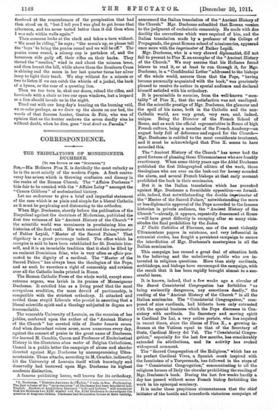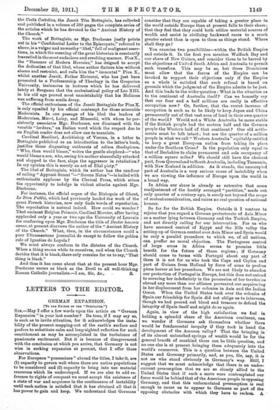CORRESPONDENCE.
TM; TRIBULATIONS OF MONSEIGNEUR DUCHESNE.
[To TEll EDITOR OM TIE " SPECTATOR:1
Sin,—His Holiness Pius X. is decidedly the most unlucky as he is the most saintly of the modern Popes. A fresh contro- versy has arisen which is throwing confusion and dismay in the ranks of the Roman Church. The " Affaire Duchesne " bids fair to be counted with the " Affaire Loisy " amongst the " Causes Celebres" of ecclesiastical history.
Let me endeavour to give a brief and impartial statement of the case which is as plain and simple for a liberal Catholic as it must be perplexing and distressing to the orthodox.
When Mgr. Duchesne, shortly before the publication of the Encyclical against the doctrines of Modernism, published the first two volumes of his "Ancient History of the Church "* the scientific world was unanimous in proclaiming him an historian of the first rank. His work received the imprimatur of Father Lepidi, " Master of the Sacred Palace." That dignitary is a great personage indeed. The office which be occupies is said to have been established for St. Dominic him- self, and it is an invariable tradition that it shall be filled by an eminent Dominican friar, who is very often ee officio pro- moted to the dignity of a cardinal The "Master of the Sacred Palace" has always been the theologian of the Pope, and as such he exercises a right of censorship and revision over all the Catholic books printed in Rome.
The Roman Catholic Press of the whole world, except some extreme organs, was lavish in its praises of Monseigneur Duchesne. It extolled him as a living proof that the most scrupulous erudition, the most devoid of partisanship, is compatible with the strictest orthodoxy. It attacked and reviled those stupid Liberals who persist in asserting that a liberal scientific spirit and a theology subjected to dogma are irreconcilable.
The venerable University of Louvain, on the occasion of her jubilee, conferred upon the author of the "Ancient History of the Church " her coveted title of Doctor honoris causa. And when discordant voices arose, more numerous every day, against the concert of praise to the great name of Duchesne, the learned M. Canchie, Canon and Professor of Ecclesiastical History in the illustrious alma mater of Belgian Catholicism, blamed in a public letter the campaign of abuse and slander directed against Mgr. Duchesne by uncompromising Ultra- montanists. Those attacks, according to M. Canchie, indirectly Lit the University of Louvain itself which knowingly and deservedly had bestowed upon Mgr. Duchesne its highest academic distinction.
A famous publishing house, well known for its orthodoxy,
• L. Duchesne, " Histoire Ancienne de Itglise," 3 vols. in Svo. Fontemoing. The first volume of the " opus magnum" of Duchesne has been translated into English. Readers of Archbishop Benson's " Life and Letters " will remember that his Holiness Leo XIII. singled out the Abbe Duchesne to investigate the question of Anglican Orders. Duchesne had declared in favour of their validitz.
announced the Italian translation of the "Ancient History of the Church." Mgr. Duchesne submitted that Roman version to the judgment of ecclesiastic censorship. He made with due docility the corrections which were required of him, and the Italian translation made by a professor of the College of Propaganda, the great Roman school of missionaries, appeared once more with the imprimatur of Father Lepidi.
Mgr. Duchesne, who is a very shrewd diplomatist, did not fail to present to Pins X. an exemplar of the "Ancient History of the Church." We may assume that his Holiness found leisure to read it, or at least to run through it, for Mgr. Duchesne, in a " Confidential Letter "addressed to the bishops of the whole world, assures them that the Pope, " having become personally acquainted with the book," was graciously pleased to receive its author in special audience and declared himself satisfied with his orthodoxy.
It is permissible to surmise, from the well-known " men- tality" of Pius X., that the satisfaction was not unalloyed. But the scientific prestige of Mgr. Duchesne, the glamour and the spell of his name, both in the Catholic and the non- Catholic world, are very great, very rare, and, indeed, unique. Being the Director of the French School of Rome, and as such the official representative in Rome of high French culture, being a member of the French Academy—an august body full of deference and regard for the Church— Mgr. Duchesne is entitled to the most considerate treatment, and it must be acknowledged that Pins X. seems to have accorded this.
The "Ancient History of the Church " has never had the good fortune of pleasing those Ultramontanes who are frankly reactionary. When some thirty years age the Abb6 Duchesne published the first lithographed edition of the work, those theologians who are ever on the look-out for heresy sounded the alarm, and several French bishops at that early moment prohibited the book in their seminaries.
But it is the Italian translation which has provoked against Mgr. Duchesne a formidable opposition—so formid- able, indeed, that notwithstanding the double imprimatur of the "Master of the Sacred Palace," notwithstanding the more or less diplomatic approval of the Pope accorded to the famous historian in private audience, the "Ancient History of the Church "—already, it appears, repeatedly denounced at Rome —will have great difficulty in escaping after so many vicis- situdes the final prohibition by the Index.
L' Unitas Cattolica of Florence, one of the most violently Ultramontane papers in existence, and very influential in extremist circles, has fought a persistent campaign to secure the interdiction of Mgr. Duchesne's masterpiece in all the Italian seminaries.
This campaign has roused a great deal of attention both in the believing and the unbelieving public who are in- terested in religions questions. More than sixty cardinals, archbishops, and bishops have encouraged the campaign, with the result that it has been rapidly brought almost to a suc- cessful issue.
It is known, indeed, that a few weeks ago a circular of the Secret Consistorial Congregation has forbidden " as being eminently dangerous, nay sometimes deadly," the reading of the " Ancient History of the Church " in all the Italian seminaries. The " Consistorial Congregation," com- posed of nine cardinals, bad hitherto been only entrusted with the special business which the Pope discusses in Con- sistory with cardinals. Its Secretary and moving spirit is Cardinal De Lai, a very active prelate, who has acquired in recent times, since the illness of Pius X., a growing in- fluence at the Vatican equal to that of the Secretary of State, Cardinal Merry del Val. The " Coasistorial Congre- gation," especially for the last few months, has oonsiderably extended its attributions, and its activity has evoked widespread comment.
The " Sacred Congregation of the Religious," which has as its prefect Cardinal Fives, a Spanish monk inspired with the fanaticism of a Torquemada, has followed in the steps of the " Consistorial Congregation," communicating to all the religious houses of Italy the circular prohibiting the reading of Mgr. Duchesne's book. During the last few weeks hardly a day has passed without some French bishop forbidding the work in his episcopal seminary.
It is under these propitious circumstances that the chief initiator of the hostile and henceforth victorious campaign of the Unita. Cattolica, the Jesuit Tito Bottagisio, has collected and published in a volume of 580 pages the complete series of the articles which he has devoted to the " Ancient History of the-Church."
The work of Bottagisio, as Mgr. Duchesne justly points out in his "Confidential Letter to the Episcopate," referred to above, is a vulgar and unworthy" libel," full of malignant asser- tions, in which the meaning of the great historian is constantly travestied in the most audacious and revolting manner. Pius X., the "Hamner of Modern Heresies," has deigned to accept the dedication of that libel, whose author flatters him without shame and restraint, and calls him the " immortal " Pins, X., whilst another Jesuit, Father Mateucci, who has just been promoted to a Professorship of Theology in the Gregorian University, insinuates in lectures which he has delivered lately at Bergamo that the ecclesiastical policy of Leo XIII. in his old age proved most unmistakably that his Holiness was suffering from senile decay.
The official enthusiasm of the Jesuit Bottagisio for Pius X. is only equalled by his official contempt for those miserable Modernists. In one passage of his libel. the leaders of Modernism, Murri, Loisy, and Minocchi, with whom he per- sistently associates Mgr. Duchesne, are dismissed with the vocable " lordura," an Italian word which the respect due to an English reader does not allow one to translate.
- Cardinal Bacilieri, Archbishop of Verona, in a letter to Bottagisio published as an introduction to the latter's book, justifies those disgusting outbursts of odium theologicum. " Who, then would blame," writes the gentle shepherd—" who would blame a son, who, seeing his mother shamefully attacked and slapped in the face, slaps the aggressor in retaliation ? In my opinion this is merely an act of filial piety."
The libel of Bottagisio, which its author has the candour of calling " Appunti Sereni "—" Serene Notes "—is hailed with enthusiastic applause by the Clerical Press, which seizes the opportunity to indulge in violent attacks against Mgr. Ditchesne.
For instance, the official organ of the Bishopric of Ghent, Le Bien Public, which had previously lauded the work of the great French historian, now only finds words of reprobation. The reprobation is natural indeed. How could we wonder ? That eminent Belgian Primate, Cardinal Mercier, after having applauded only a year or two ago the University of Louvain for conferring upon Mgr. Duchesne the title of Doctor hanoris cause, at present disavows the author of the "Ancient History of the Church." What, then, in the circumstances could a poor Ultramentane journalist do except to follow the golden rule of Ignatius de Loyola ?
We must always conform to the dictates of the Church. When a thing seems white to ourselves, and when the Church decides that it is black, there only remains for us to say, " That thing is black."
And thus it has come about that at the present hour Mgr. Duchesne seems as black as the Devil to all well-thinking Roman Catholic journalists.—I am, Sir, &c., - S.







































 Previous page
Previous page